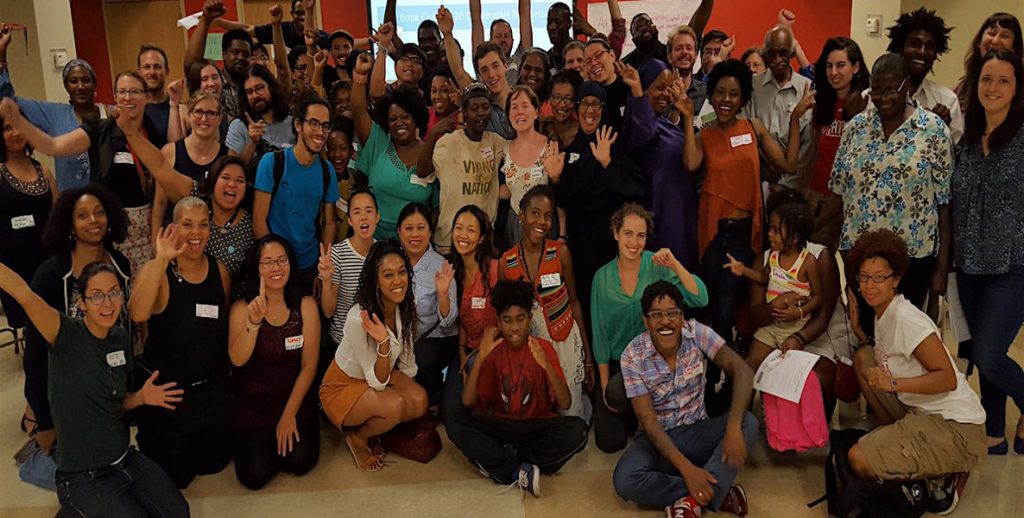The city of Chester has more than 34,000 residents and spans almost five square miles but has just one grocery store. And even that is a recent development, and it’s a nonprofit; no big grocery chain wants to open there, for fear of losing money. For years before 2013, residents had to take the bus or drive outside their city just to buy basic fresh foods like potatoes or lettuce.
Chester resident Terrence Topping-Brown, along with a group of growers, planters, educators, artists, professors and researchers who call themselves Plant It Planet want to change this. They formed an urban farm and opened it for anyone to participate. But Chester’s situation is so dire it needs a solution way beyond business as usual. Topping-Brown’s group wants to create a community-owned garden, community center and marketplace that would be available to every resident of Chester, and in which every resident would have a hands-on and financial stake.
“We want to create a sustainable food system,” says Topping-Brown, “where food is grown by and for our community, which is largely a community of color.”
![]()
Under this program, which kicked off this week, 20 groups of Philadelphians with an idea for a cooperatively-owned business to fill a need in their community will meet twice a month to read books and articles and watch documentaries and more on how to make their plan a reality.
“Cooperatives are the original social enterprise,” says Caitlin Quigley, PACA’s Director of Communication and Development. “It’s a business that exists for a social purpose. It’s democratically owned and controlled by the people who use it.”
PACA, formed in 2012, is essentially a cooperative of cooperatives. It supports the creation of new cooperative businesses, especially those that are democratically controlled by underserved communities, such as African Americans, Latinos, migrant workers and undocumented workers, in order to promote racial justice, community equity, and democratic control of businesses by average citizens. Cooperative, or worker-owned, businesses have seen success in other cities like Cleveland and Rochester under Mayor Lovely Warren, where they are helping to create jobs and revitalize low-income communities that for-profit companies often snub.
But how could book clubs turn into cooperatively-owned businesses?
The seed for the program was planted when Quigley was—appropriately—reading a book. The book was Collective Courage: A History of African-American Cooperative Economic Thought and Practice by economist Jessica Gordon Nembhard which profiled many successful African-American run cooperative businesses. Quigley began to notice a pattern: Every single cooperative Nembhard included had started out as a study group or book club.
“When I realized that, I felt like that was an incredibly important detail to take away in our efforts to grow the number of cooperatively-owned businesses in Philadelphia,” Quigley recalls.
Since April, PACA has received applications from 30 community groups who had identified a business need in their community and were interested in working together to fill it. Ultimately, they accepted 20 groups to participate in the program, reflecting the demographics of Philadelphia. “We have a really diverse group—regionally, racially, ethnically, linguistically, age-wise—and they have a wide range of interests,” Quigley says.
Some members of the 20 groups live near each other and plan to root their businesses geographically—like Ariesha Geier, Darasia Selby, and Golden Ré of the Philly Black Healers Collective. The Germantown residents, who identify as a spiritual family practicing in the Yoruba tradition of West Africa, are working to create a space where people of color can come together to seek and provide services around physical, mental, holistic, and traditional healing. “Black and brown people have often been disempowered and told by doctors take this pill, take this medicine,” says Geier. “But we have a lot of power to heal ourselves and make empowered choices, and we want to provide a space for that to happen.”
Others, like the Media Mobilizing Project, bring together people from across the city with a common need and purpose. “Freelance media makers, especially those who do social justice media work like we want to do, often scrape by on their own,” says Milena Velis, part of a group working to start a worker-owned cooperative media business that would splinter off from MMP. “But if we could pool resources, share equipment, office space and skills, we could sustain the livelihoods of all kinds of creators.”
Book clubs will meet twice a month, once with a PACA staff or volunteer present and once without. They will receive funding to rent meeting space, provide meals and also childcare during meetings. PACA also recently provided orientation, training and guidance—held both in English and in Spanish—creating the syllabi and materials for the study groups. At the orientation events, PACA had many different stations set up with books, articles, and DVDs about cooperative businesses as well as information on more specific project areas like collective farming or worker-run restaurants and practical skills like how to run a bookkeeping business.
“There’s no cookie cutter study group plan that would be appropriate for all the groups,” says Quigley. “All the groups have very different interests, languages, and literacy levels. And these events are also for the groups to talk, exchange ideas, and cross-pollinate.”
After six months, in March 2017, groups interested in continuing will move onto the next phase: intensive business development. For eight months, PACA and other culturally-appropriate business developers will provide assistance in developing a business plan and bylaws, and a plan for how the co-op will be run and governed by its members, and choosing a location. Through Kiva Zip, a no-interest loan program run with the City of Philadelphia’s Commerce Department, PACA can help arrange micro-loans of up to $5,000, such as the one it provided to co-op W/N W/N coffee bar to open in 2015. And Quigley says PACA will work to connect startup cooperatives with sources of funding from their extended network of local and national connections, including the national The Working World.
“We’re giving it a try,” says Quigley, acknowledging that this idea is somewhat untested. “Even if not all of these groups go on to open cooperative businesses, if they spend six months studying how people solve problems in their communities, they’ll be more likely to come together to improve their lives and their neighborhoods.”
The principle underlying the whole project is simple yet innovative: to bring together groups of people from across Philadelphia to share their knowledge and traditions of cooperation. “All communities have ways and traditions of cooperating with each other to make their lives better and happier,” says Quigley. “The book clubs are a formal way to uplift all those traditions and show each other the ways we already cooperate.”


